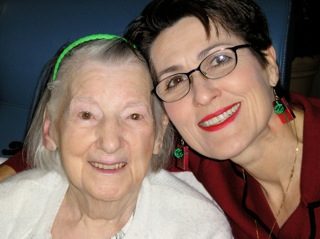Loretta S. Downs
Chicago, Illinois, USA

A war started the day my mother was forced to move into a nursing home. After years of slow progression, the stenosis in her back refused to let her live independently any longer.
From the moment she arrived, I spent five days a week trying to help her adjust—hoping she would forgive me for moving her out of the home she had loved for 54 years. She hardly spoke to me for three months, and she boycotted the Christmas party that year.
She was 88, I was 51, and we were locked in a lifetime of codependency that made me hate my mother as much as I loved her. All I wanted was a taste of her sweet approval, which she rationed like a rare vintage wine.
At first we took our respective guilt and anger out on the staff, complaining about everything we could find to complain about. The room was too hot or too cold. The food was too cold, too salty, too spicy, too soft, too hard, or arrived too late. The nurse came with the pills too early, too late, or she took too long to answer a call. The aides were too few, too busy talking to each other, too slow, or too fast with their care. The housekeeping was too careless or too infrequent. Everything was a negative superlative issued swiftly—and sometimes, harshly.
A year passed before we came to accept the situation as it was. Eventually the fight left us and we surrendered to the future. We got to know the place and found community within it. We allowed the staff into our lives and learned that they were just like us. We came to appreciate the hard and kind work so many of them did for us, even choosing some of them to become part of our family.
We met the neighbors—men and women who, like my mother, had left behind the life they knew and loved when they came, involuntarily, to this barren place. We made friends with the residents and their daughters, sons, nieces, and nephews.
We created a new “normal” life, and within it we found each other. Sharing her experience transformed both of us. At the beginning of her final year, I asked, “What more can I do for you?” She answered, “Just be with me.”
After that, I would get in bed with her, and she would call me “My Beautiful Baby, Loretta,” words I had been hungry to hear for half a century. We fell in love in that nursing home, where, like all such places, suffering is a part of daily life and death is a familiar face.
The last photo I have of my mother before she became too weak to leave her bed was taken at the Christmas party. I am wearing a pair of holiday earrings, and she is wearing a genuine smile.
Are you happy, Mom? I asked.
“Oh, yes, I am happy,” she said, for the first time in her life.
And that is how she left this life, four months later. Happy.
LORETTA S. DOWNS, MA, speaks and writes about supporting positive experiences at the end of life. She founded ChrysalisTM End-of-Life Inspirations to advocate for nursing homes and hospitals to provide private rooms making it possible for loved ones to keep vigil with the dying. She is president of the Chicago End-of-Life Care Coalition, a Certified End-of-Life Care Practitioner, and a Respecting ChoicesTM Advance Care Planning Facilitator. She is a member of the Advocate Illinois Masonic Medical Center ethics committee, the Association for Death Education and Counseling, the American Society on Aging, the Society for the Arts in Health Care, and the Pioneer Network. She holds a master’s degree in Gerontology.
Highlighted in Frontispiece Volume 3, Issue 2 – Spring 2011

Leave a Reply